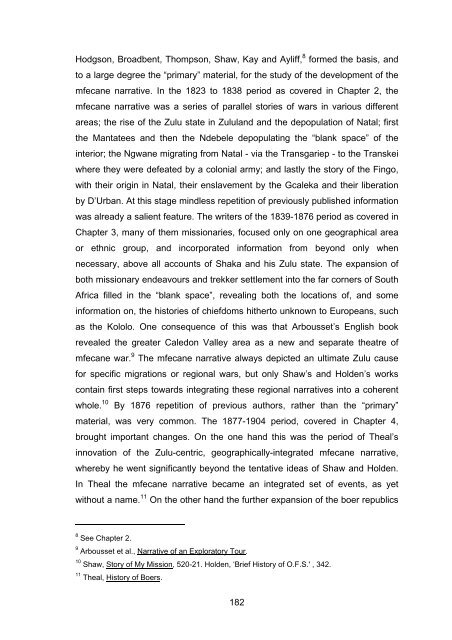The Historiographical Development of the Concept “mfecane” and ...
The Historiographical Development of the Concept “mfecane” and ...
The Historiographical Development of the Concept “mfecane” and ...
Create successful ePaper yourself
Turn your PDF publications into a flip-book with our unique Google optimized e-Paper software.
Hodgson, Broadbent, Thompson, Shaw, Kay <strong>and</strong> Ayliff, 8 formed <strong>the</strong> basis, <strong>and</strong><br />
to a large degree <strong>the</strong> “primary” material, for <strong>the</strong> study <strong>of</strong> <strong>the</strong> development <strong>of</strong> <strong>the</strong><br />
mfecane narrative. In <strong>the</strong> 1823 to 1838 period as covered in Chapter 2, <strong>the</strong><br />
mfecane narrative was a series <strong>of</strong> parallel stories <strong>of</strong> wars in various different<br />
areas; <strong>the</strong> rise <strong>of</strong> <strong>the</strong> Zulu state in Zulul<strong>and</strong> <strong>and</strong> <strong>the</strong> depopulation <strong>of</strong> Natal; first<br />
<strong>the</strong> Mantatees <strong>and</strong> <strong>the</strong>n <strong>the</strong> Ndebele depopulating <strong>the</strong> “blank space” <strong>of</strong> <strong>the</strong><br />
interior; <strong>the</strong> Ngwane migrating from Natal - via <strong>the</strong> Transgariep - to <strong>the</strong> Transkei<br />
where <strong>the</strong>y were defeated by a colonial army; <strong>and</strong> lastly <strong>the</strong> story <strong>of</strong> <strong>the</strong> Fingo,<br />
with <strong>the</strong>ir origin in Natal, <strong>the</strong>ir enslavement by <strong>the</strong> Gcaleka <strong>and</strong> <strong>the</strong>ir liberation<br />
by D’Urban. At this stage mindless repetition <strong>of</strong> previously published information<br />
was already a salient feature. <strong>The</strong> writers <strong>of</strong> <strong>the</strong> 1839-1876 period as covered in<br />
Chapter 3, many <strong>of</strong> <strong>the</strong>m missionaries, focused only on one geographical area<br />
or ethnic group, <strong>and</strong> incorporated information from beyond only when<br />
necessary, above all accounts <strong>of</strong> Shaka <strong>and</strong> his Zulu state. <strong>The</strong> expansion <strong>of</strong><br />
both missionary endeavours <strong>and</strong> trekker settlement into <strong>the</strong> far corners <strong>of</strong> South<br />
Africa filled in <strong>the</strong> “blank space”, revealing both <strong>the</strong> locations <strong>of</strong>, <strong>and</strong> some<br />
information on, <strong>the</strong> histories <strong>of</strong> chiefdoms hi<strong>the</strong>rto unknown to Europeans, such<br />
as <strong>the</strong> Kololo. One consequence <strong>of</strong> this was that Arbousset’s English book<br />
revealed <strong>the</strong> greater Caledon Valley area as a new <strong>and</strong> separate <strong>the</strong>atre <strong>of</strong><br />
mfecane war. 9 <strong>The</strong> mfecane narrative always depicted an ultimate Zulu cause<br />
for specific migrations or regional wars, but only Shaw’s <strong>and</strong> Holden’s works<br />
contain first steps towards integrating <strong>the</strong>se regional narratives into a coherent<br />
whole. 10 By 1876 repetition <strong>of</strong> previous authors, ra<strong>the</strong>r than <strong>the</strong> “primary”<br />
material, was very common. <strong>The</strong> 1877-1904 period, covered in Chapter 4,<br />
brought important changes. On <strong>the</strong> one h<strong>and</strong> this was <strong>the</strong> period <strong>of</strong> <strong>The</strong>al’s<br />
innovation <strong>of</strong> <strong>the</strong> Zulu-centric, geographically-integrated mfecane narrative,<br />
whereby he went significantly beyond <strong>the</strong> tentative ideas <strong>of</strong> Shaw <strong>and</strong> Holden.<br />
In <strong>The</strong>al <strong>the</strong> mfecane narrative became an integrated set <strong>of</strong> events, as yet<br />
without a name. 11 On <strong>the</strong> o<strong>the</strong>r h<strong>and</strong> <strong>the</strong> fur<strong>the</strong>r expansion <strong>of</strong> <strong>the</strong> boer republics<br />
8 See Chapter 2.<br />
9 Arbousset et al., Narrative <strong>of</strong> an Exploratory Tour.<br />
10 Shaw, Story <strong>of</strong> My Mission, 520-21. Holden, ‘Brief History <strong>of</strong> O.F.S.' , 342.<br />
11 <strong>The</strong>al, History <strong>of</strong> Boers.<br />
182

















